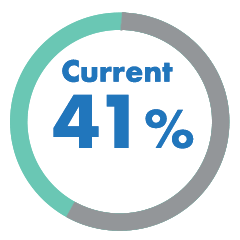A joint brokerage account lets two or more people manage investments together. Whether you’re a couple, siblings, or business partners, this type of account helps you pool resources and simplify financial management. In this article, we’ll cover what a joint brokerage account is, the types, benefits, downsides, and how to open one.
Key Takeaways
- A joint brokerage account allows two or more individuals to pool resources for investment.
- Joint brokerage accounts are legally binding, and each account holder is responsible for fees,
taxes, and penalties (1). - This type of account is ideal for those with aligned goals, like married couples managing their money together or business partners investing in shared projects.
What Is a Joint Brokerage Account?

A joint brokerage account is essentially an investment account that is owned by or two more individuals.
This is a great choice for people who want to invest together, like couples, siblings, or business partners. Instead of each person managing their own account, a joint brokerage account lets them pool their resources.
By combining funds, joint account holders can often access lower fees, make bigger investments, and streamline their finances. But it does require a high level of trust, since everyone on the account can make transactions and control the investments.
Keep in mind, everyone on the account can make transactions and control the investments, so be sure everyone is on the same page!
Types of Joint Brokerage Accounts

Joint brokerage accounts come in several types, each with its own rules and benefits.
There are three main types of ownership:
In a Tenancy in Common (TIC):
In this type of account, each person owns a set percentage and can sell or transfer their share independently. This setup is ideal for co-owners who want to keep individual control over their part of the investments.
Joint Tenancy with Rights of Survivorship (JTWROS):
This common type of joint account automatically transfers ownership to the surviving holder(s) if one account owner passes away. It’s a good choice for those who want a smooth, probate-free transfer of assets.
Tenancy by the Entirety (TBE):
This account type is only for married couples. It offers strong protection from creditors, as neither spouse can sell or transfer their share without the other’s consent. TBE accounts provide joint ownership and survivorship benefits.
Advantages of Joint Brokerage Accounts

Joint brokerage accounts come with some great perks:
- Increased investment power: Pooling funds allows for larger, more diverse investments.
- Simplified tax reporting: Joint earnings and transactions make tax filing easier.
- Shared management: Collaborative decision-making can lead to smarter investments.
- Aligned financial goals: Great for couples or partners with shared financial objectives.
Disadvantages of Joint Brokerage Accounts

While joint brokerage accounts offer benefits, they also have some risks to consider:
- Trust is crucial: If the relationship between account holders breaks down, one person could liquidate assets, which can cause conflicts.
- Shared financial responsibility: If one person mismanages funds or takes on debt, it can impact all account holders and put assets at risk.
- Careful planning needed: It’s important to choose reliable partners and set clear agreements to avoid any issues.
How to Open a Joint Brokerage Account

Now, how do you actually open a joint brokerage account? Well, here’s how:
- Gather Information: Collect personal details for all account holders, like ID, social security numbers, and financial info.
- Complete Forms: Fill out the forms provided by the brokerage, outlining the account’s ownership structure and responsibilities.
- Choose a Brokerage: Pick a reputable firm with a solid track record and good customer support to help manage your account effectively.
Managing a Joint Brokerage Account

Managing a joint brokerage account is actually pretty simple; it really just boils down to two practices.
First and arguably the most important, keep communication open and regular by discussing investment strategies and goals to ensure everyone is on the same page. Keeping with the same theme, make sure everyone also agrees on risk tolerance.
Second, be sure to maintain detailed transaction records for transparency and better decision-making.
Tax Implications of Joint Brokerage Accounts

Joint brokerage accounts come with important tax considerations that all account holders should be aware of. For married couples, taxes are usually straightforward since income is treated equally on both partners’ tax returns, making tax filing easier.
On the other hand, unmarried co-owners face a more complicated situation. Each person needs to report income based on their ownership share, and if one person transfers more than their share, it could be seen as a taxable gift.
Also, remember that all account holders are jointly responsible for any taxes that come up, including those from trading activities.
Wondering if you need a financial advisor? Then be sure to visit IFW to find a financial professional that suits your needs and goals!
Legal Considerations and Liability

Joint brokerage accounts come with various legal responsibilities and potential risks that all parties involved should be aware of.
Everyone in a joint brokerage account is legally accountable for any charges, taxes, or penalties incurred from transactions made in the account. This joint responsibility means that all account holders should be diligent in managing the account.
Also, in a joint account, if one person succeeds, everyone benefits, but if one person runs into trouble, it can affect all account holders. For instance, joint accounts can be vulnerable to creditor claims, meaning all account owners are at risk if one faces debt issues.
In the case of diminished mental capacity of one holder, having legal documentation, such as a power of attorney, is important for managing the account. This documentation ensures that the account can continue to be managed effectively without interruption.
Choosing the Right Brokerage Firm

Now, it’s not enough for all account holders to be on the same page. The brokerage firm also plays a crucial role in the success of a joint account.
It’s important to choose a reputable brokerage that offers clear communication and strong customer support. They should provide resources and tools to help you manage your investments effectively and keep everyone informed about account activity.
Additionally, make sure that the brokerage understands the specific needs of all the account holders and can guide you through any legal or tax implications. A firm that prioritizes transparency and accountability will help all account holders feel confident and secure in their investment decisions. With the right brokerage by your side, you can work together more effectively and achieve your financial goals as a team.
Summary
Joint brokerage accounts have their pros and cons that need careful thought. On the plus side, they offer more investment power, easier tax reporting, and shared financial responsibilities. But they also require a lot of trust, clear communication, and good planning to avoid risks.
By understanding the different types of joint accounts, their benefits, and the potential drawbacks, you can make smart choices that fit your financial goals. Whether you choose a joint or individual brokerage account, the key is to select the option that best supports your investment strategy and long-term objectives.
See How You Can Boost Your IFW Retirement Score

When you request your IFW Retirement Score, an IFW Certified Financial Professional will help you discover ways to:

Lower or potentially eliminate taxes in retirement

Protect your retirement portfolio

Secure a stable income stream throughout retirement
Frequently Asked Questions
What is a joint brokerage account?
A joint brokerage account is an investment account jointly owned by two or more individuals, allowing shared access and rights to the account’s assets. This arrangement enables collaborative investment decisions among the account holders.
What are the main types of joint brokerage accounts?
The main types of joint brokerage accounts are Tenancy in Common (TIC), Joint Tenancy with Rights of Survivorship (JTWROS), and Tenancy by the Entirety (TBE). Each type has distinct legal implications regarding ownership and transfer of assets upon death.
What are the advantages of joint brokerage accounts?
Joint brokerage accounts offer enhanced investment capabilities, streamlined tax reporting, and the ability to share financial responsibilities between account holders. These advantages can facilitate better financial management and collaboration in investment decisions.
What are the potential disadvantages of joint brokerage accounts?
Joint brokerage accounts can lead to issues of trust and potential conflicts between account holders, as well as increased exposure to creditor claims. Therefore, it is essential to carefully consider these risks before opening such an account.
How do I choose the right brokerage firm for a joint brokerage account?
Choosing a well-reputed brokerage firm with excellent customer service and a proven track record is essential for a joint brokerage account. This ensures you and your partner receive reliable support throughout your investment journey.




